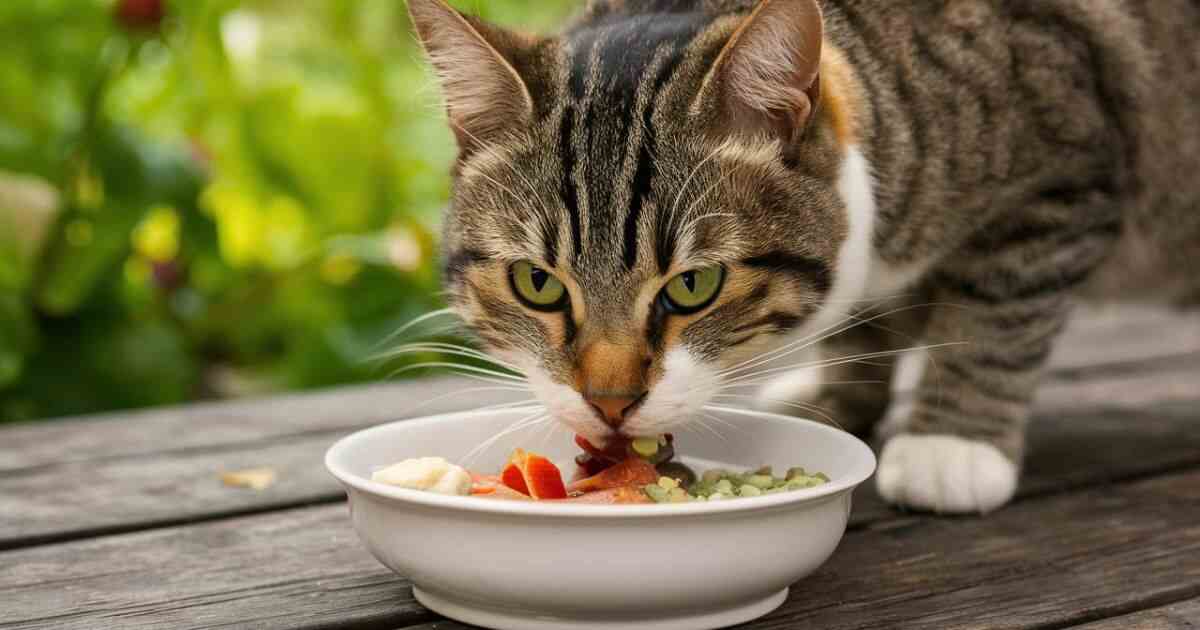10 Basics of a Homemade Fresh Diet for Cats
Introduction
Feeding your cat a homemade diet can be very beneficial. It can improve your cat’s health and strengthen your bond with them. However, making sure the diet is healthy and balanced is important. To ensure your cat gets all the necessary nutrients, it’s important to talk to a veterinarian.

1. Talk to Your Vet
Before starting a homemade diet for your cat, talk to your veterinarian. They can evaluate your cat’s needs, offer tailored diet advice, and check for health issues.
2. Use High-Quality Ingredients
A healthy homemade diet starts with good ingredients. Choose fresh, unprocessed, and human-grade foods. Stay away from low-quality or canned meats that might have harmful additives.
3. Balanced Nutrition
A healthy cat diet needs different nutrients, like protein, carbohydrates, fats, vitamins, and minerals. Protein helps build and repair muscles, carbohydrates give energy, and fats are important for healthy skin and coat. Make sure your homemade diet has the right balance of these nutrients to meet your cat’s needs.
4. Raw or Cooked Food?
Choosing between raw or cooked food for your cat is a personal decision. Raw food can help with digestion and nutrient absorption, but you need to handle it carefully to avoid foodborne illnesses. If you decide on cooked food, make sure the meat is fully cooked to kill any harmful bacteria.
5. Protein Sources
Protein is very important in a cat’s diet. Choose lean proteins like chicken, turkey, beef, fish, or eggs. Be careful not to use too much organ meat, as it can have high levels of phosphorus.
6. Carbohydrates
Cats mainly eat meat, but they can still benefit from some carbohydrates. You can add whole grains like brown rice, quinoa, or oats to their diet. Avoid processed grains and sugary treats.
7. Fats
Healthy fats are important for your cat’s health. You can add fats like olive oil, coconut oil, or flaxseed oil to their diet. But don’t use too much fat, as it can cause weight gain and other health issues.
8. Vitamins and Minerals
To make sure your cat gets all the vitamins and minerals they need, you might want to add a cat-specific multivitamin or mineral supplement to their homemade diet. Ask your veterinarian for the right dosage.
9. Hydration
Make sure your cat stays hydrated by always offering fresh water. You can encourage them to drink more by using a water fountain or adding a little low-sodium broth to their water.
10. Gradual Transition
To help your cat adjust to a homemade diet, mix a little of the homemade food with their regular food over 7-10 days. Slowly increase the amount of homemade food while decreasing the regular food until they are eating only the homemade diet.
Conclusion
Feeding your cat a homemade diet can be very rewarding. By following these tips and talking with your veterinarian, you can give your cat a healthy and balanced meal plan that supports their overall health. Remember, every cat’s needs are different, so adjust their diet to fit them.
FAQs | 10 Basics of a Homemade Fresh Diet for Cats: Our Vet Explains
Q1. Can I feed my cat only homemade food?
A: While it’s possible to feed your cat exclusively a homemade diet, it’s essential to consult with your veterinarian to ensure it meets their specific nutritional needs. They can help you create a balanced diet that provides all the necessary vitamins and minerals.
Q2. What are the potential risks of feeding my cat a homemade diet?
A: If not properly formulated or monitored, a homemade diet can lead to nutritional deficiencies or imbalances. It’s crucial to ensure the diet includes all the essential nutrients, including protein, carbohydrates, fats, vitamins, and minerals. Additionally, there is a risk of foodborne illnesses if raw meat is not handled properly.
Q3. How often should I feed my cat a homemade diet?
A: The frequency of feeding depends on your cat’s age, activity level, and individual needs. Consult with your veterinarian to determine the appropriate feeding schedule.
Q4. Can I use leftover human food for my cat’s homemade diet?
A: While some human foods can be incorporated into a homemade cat diet, it’s important to avoid foods that are high in salt, sugar, or unhealthy fats. Additionally, certain human foods, such as onions and garlic, can be toxic to cats. Always consult with your veterinarian before including any human food in your cat’s diet.